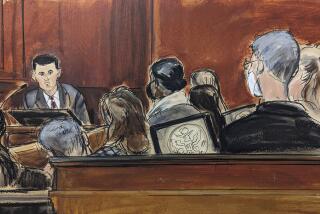Testimony Ends in Insider Trading Trial of Carl’s Jr. Executive
- Share via
LOS ANGELES — Testimony in the insider trading trial of Alvin DeShano came to a close Wednesday as jurors were asked to decide if the Carl’s Jr. accountant intended to use confidential company information to avoid a stock market loss of $7,107 five years ago.
“This is a very simple case,” Assistant U.S. Atty. James Sanders said in his final argument. “Al DeShano wanted to sell his stock, save as much money as possible, and put it in his pocket. And that’s exactly what he did.”
But defense lawyer David Wiechert told jurors the case is “as complicated as the human mind. You have to determine what (DeShano) was thinking when he sold his stock. . . . It involves an honest person, trying to do the best he can, who did everything right.”
The arguments capped five days of testimony by 16 witnesses in U.S. District Court. DeShano, who turns 55 today, is accused of avoiding potential stock market losses by relying on confidential information to sell his stock in Anaheim-based Carl Karcher Enterprises.
DeShano sold his 1,725 shares of Karcher stock on Oct. 15, 1984, the first trading day after company executives received a preliminary internal report estimating that earnings for one month would be as much as $900,000 below earlier projections.
When news of the fast-food chain’s lower earnings became public on Oct. 23, Karcher stock plunged $4.125 per share to $17.375.
Throughout the trial, defense lawyer Wiechert portrayed DeShano as an honest but unsophisticated investor who was intensely loyal to Karcher Enterprises, his employer for 15 years.
During his final argument Wednesday, Wiechert noted that DeShano had discussed selling his company stock with two Karcher executives before he had any idea about the impending drop in the company’s profits.
The defense lawyer said company controller George Cloward advised DeShano on Oct. 1, 1984, that it would be all right to sell his shares. While Cloward testified that he did not recall the conversation, another Karcher executive, Elaine Falbe, said she heard the exchange.
He said DeShano had other valid reasons to sell. DeShano and his wife, Paula, were thinking about buying a mountain cabin, and DeShano’s son, Daniel, wanted to borrow $5,000, according to trial testimony. And DeShano wanted to diversify his investments, Wiechert said.
“All of these explanations are reasonable,” Wiechert said. The confidential report “had no impact on Al DeShano’s decision to sell because he already had made that decision earlier.”
But Sanders, the prosecutor, noted that DeShano had asked Karcher executives about selling his stock before the damaging preliminary report was released.
“After that report was released nobody could sell,” Sanders told jurors. “Everybody knew that. And nobody told Al DeShano he could sell based on that report,” Sanders said.
DeShano “sold on Oct. 15 and that’s the day the company got the bad news about earnings. That report told him to do it. And that’s enough for insider trading,” Sanders said.
If convicted, DeShano faces up to five years in prison and a $250,000 fine.
Jurors are expected to begin deliberations today.
More to Read
Inside the business of entertainment
The Wide Shot brings you news, analysis and insights on everything from streaming wars to production — and what it all means for the future.
You may occasionally receive promotional content from the Los Angeles Times.










